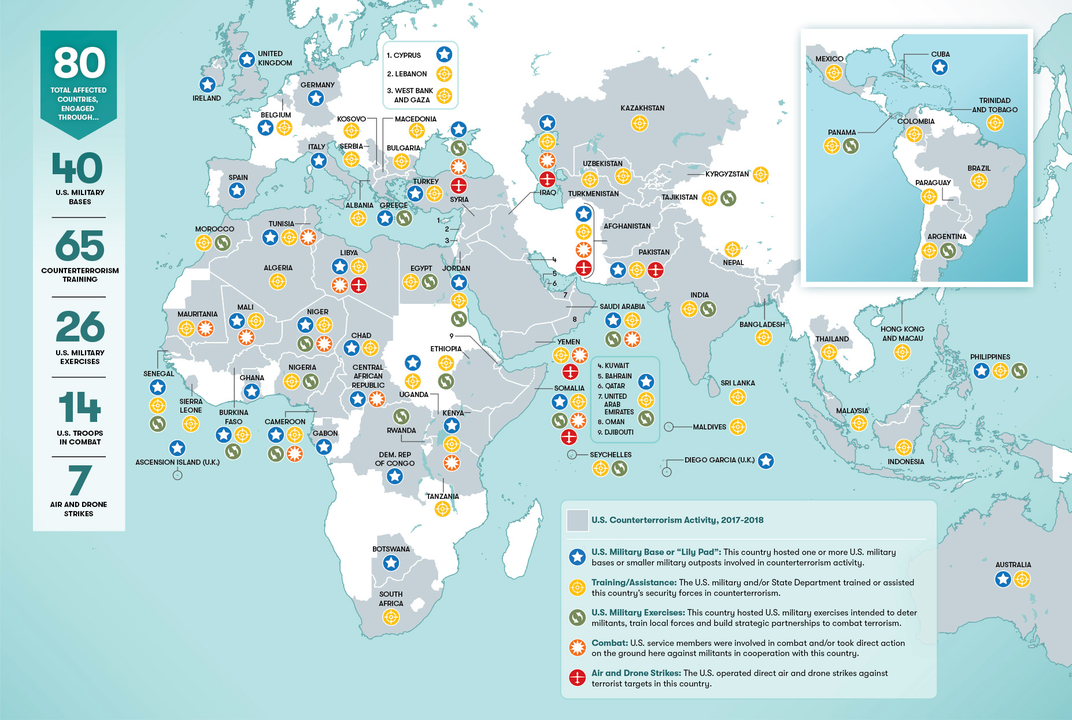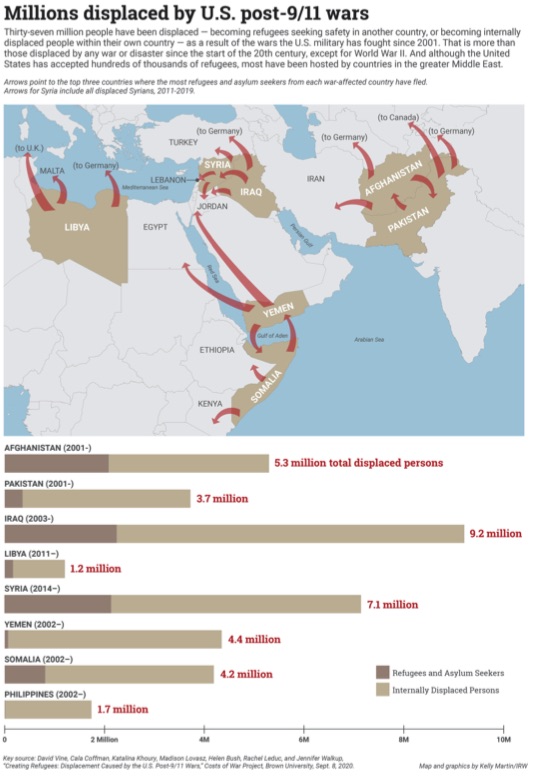In November of 2018, the Costs of War project at Brown University reported:
The United States has appropriated and is obligated to spend an estimated $5.9 trillion (in current dollars) on the war on terror through Fiscal Year 2019, including direct war and war-related spending and obligations for future spending on post 9/11 war veterans. This number differs substantially from the Pentagon’s estimates of the costs of the post-9/11 wars because it includes not only war appropriations made to the Department of Defense – spending in the war zones of Iraq, Syria, Afghanistan, Pakistan, and in other places the government designates as sites of “overseas contingency operations,” – but also includes spending across the federal government that is a consequence of these wars. Specifically, this is war-related spending by the Department of State, past and obligated spending for war veterans’ care, interest on the debt incurred to pay for the wars, and the prevention of and response to terrorism by the Department of Homeland Security.
A year later, the estimate of direct costs stood at $6.4 trillion.

To put further perspective on this, the U.S. currently has counter-terrorism operations in 80 countries, including a global network of bases and training programs. The creators of the map shared above note, “Because we have been conservative in our selections, U.S. efforts to combat terrorism abroad are likely more extensive than this map shows. Even so, the vast reach evident here may prompt Americans to ask whether the war on terror has met its goals, and whether they are worth the human and financial costs.”
What of the human costs? Of the places where U.S. ground troops have been present in significant numbers — Afghanistan, Pakistan and Iraq — the total number of direct deaths from combat operations is estimated at between 480,000 and 507,000, including U.S. personnel. Half of those killed are civilians. Indirect deaths, or those who die as a result of collapsing infrastructure, lack of access to health case and so on, are harder to measure. The Geneva Secretariat has argued that the number of indirect deaths in global conflicts can be estimated at 4:1 the number of direct deaths. In just these three countries then, the total number of people who have died as a result of the invasions of Afghanistan and Iraq, and parallel fighting in Pakistan, is likely between 2 and 2.5 million.
With respect to the conflict in Syria, the invasion of Libya, and the ongoing counter-insurgency campaign in Yemen, each represents another tragic episode, with tens of thousands more direct deaths in conflict. Each of these wars has its own domestic roots to be sure, but the overflowing of these fights into regional, and even global, alliances at war is directly related to the collapse of the tenuous balance of power that existed in the Middle East prior to the U.S. invasion of Iraq. That balance of power was itself predicated on support for autocratic and murderous regimes by the U.S. government, and hardly something to be celebrated. But the collapse of Iraq set in motion a process of regional realignment that we are still witnessing, a process that became a bloodbath.
There are more than 79 million people displaced in the world today. At least 18 percent of those are from Iraq, Afghanistan, Pakistan or Syria. As we have written about elsewhere, many of the rest are fleeing conflicts or other circumstances set in motion by the global war on terror. This is a snapshot of one year - and far from the whole story.

This week the Cost of War project published research that unpacked the number of people displaced by these wars overtime (see map above). The summary of their conclusions:
-
-
The U.S. post-9/11 wars have forcibly displaced at least 37 million people in and from Afghanistan, Iraq, Pakistan, Yemen, Somalia, the Philippines, Libya, and Syria. This exceeds those displaced by every war since 1900, except World War II.
-
Millions more have been displaced by other post-9/11 conflicts involving U.S. troops in smaller combat operations, including in: Burkina Faso, Cameroon, Central African Republic, Chad, Democratic Republic of the Congo, Mali, Niger, Saudi Arabia, and Tunisia.
-
37 million is a very conservative estimate. The total displaced by the U.S. post-9/11 wars could be closer to 48–59 million.
-
25.3 million people have returned after being displaced, although return does not erase the trauma of displacement or mean that those displaced have returned to their original homes or to a secure life.
-
Any number is limited in what it can convey about displacement’s damage. The people behind the numbers can be difficult to see, and numbers cannot communicate how it might feel to lose one’s home, belongings, community, and much more. Displacement has caused incalculable harm to individuals, families, towns, cities, regions, and entire countries physically, socially, emotionally, and economically.
-
How does one measure the cost of this?
Just this week, in Greece, a fire broke out at the refugee camp in Moria - Europe's largest refugee camp. The people living in Moria, are largely fleeing these 9/11 wars. In response to the fires, Greece's government made clear that the refugees would be forced to stay on the island. And some of the people on the island made clear they did not want the camp there any more - going so far as to block the road so that emergency response teams could not reach the camp. Moria’s municipal community leader Yiannis Mastroyannis said, “We’ve reached our limits. We’re anxious, we feel insecure, we’re fed up, we don’t know how to act anymore.”
Surveying the damage, it is worth asking: was any of this worth it? This is often the question I hear asked – indeed there are polls that indicate 43 percent of U.S. Americans (41 percent of military service members) think we are less safe today than on September 12, 2001. Is that the appropriate measure? National Interest published an article from January 2019 that surveys impacts of the war on terror, and asks whether the war has been worth it. Without giving a direct answer, the author writes,
All of this begs the question: is Washington’s counterterrorism strategy having the desired effect of enhancing the security of Americans? Or is the strategy simply creating more terrorists than it is killing, throwing more taxpayer money down the toilet, and further straining the U.S. military’s limited resources?
We won’t know the answer until President Donald Trump orders his administration to conduct an honest, impartial, whole-of-government appraisal of the current policy. When he does, perhaps Trump will be more likely to overrule his conventional national security advisers who continue to argue for an unconditional and timeless American military commitment in Syria and Afghanistan.
It is certainly worth asking the question from the framework of impacts on the United States in terms of costs, casualties and reduction of civil liberties. This is, however, a very small part of the problem. So, I would ask the question differently: Is there ANY outcome, or benefit to the United States that is worth the death of close to 3 million people outside our border? The displacement of 38 million people or more? The violent backlash that has been exercised against these refugees? What security could ever result from such means? To ask whether "we" the United States are safer misses the whole point. The rest do the world is demonstrably less safe as a result of the 19 years of war we plummeted it in to - so, of course, that means we are less safe as well.
On September 12, 2001, the country’s leadership had a choice. They chose badly. Nationalism run rampant, fear and loathing of the “other” became the justification for an endless war, and a dramatic shifting of power to an “imperial” presidency to exercise that war.
Today the beat goes on. The Pentagon’s budget was $738 billion for Fiscal Year 2020. This year the request is $740 billion. China’s defense budget is, by comparison, $167 billion. It is worth thinking about how that money is turned into bombs and armaments that will be welded against people all over the planet. How many more will be displaced? How many more killed?
For most of the world, September 11 never ends.

